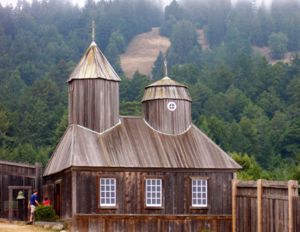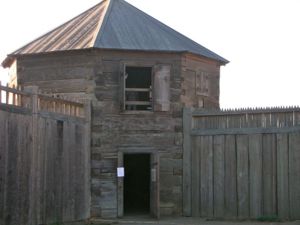Fort Ross: Difference between revisions
John Stanton (talk | contribs) |
John Stanton (talk | contribs) No edit summary |
||
| Line 1: | Line 1: | ||
{{SocialNetworks}} | {{SocialNetworks}} | ||
'''Fort Ross (1812-1841)''' - Originally established in June 1812 by | '''Fort Ross (1812-1841)''' - Originally established in June 1812 by the Russian-American Company as [[Fort Rossiya]]. The fort was purchased by Capt. [[John Sutter]] in 1841. He disassembled and shipped everything movable to Sacramento for use at [[Sutter's Fort]]. | ||
{{Clr}} | {{Clr}} | ||
[[Image:FortRoss Reconstructed Chapel.jpg|thumb|left|300px|Fort Ross Reconstructed Chapel]] | [[Image:FortRoss Reconstructed Chapel.jpg|thumb|left|300px|Fort Ross Reconstructed Chapel]] | ||
| Line 6: | Line 6: | ||
{{Clr}} | {{Clr}} | ||
== {{PAGENAME}} History== | == {{PAGENAME}} History== | ||
The trading post was laid out in a rectangle enclosed by a 14-foot redwood stockade, and guarded by two | Established in Jun 1812 by a group of 95 Russians and 40 Aleuts as the southern most trade base of the Russian-American Company, headquartered in Sitka, Alaska. The main purpose was to supply the needs of the Alaska operation. | ||
The trading post/fort was laid out in a 276 foot by 312 foot rectangle enclosed by a 14-foot redwood stockade, and guarded by two bastions at opposite corners. The northwest bastion had seven sides and the southeast one had eight, each was two stories high and had ports for cannon. Conflicting accounts indicate that there were between 12 and 40 cannons at the fort but the fort was never threatened by any hostile group. | |||
There were more than 50 buildings identified with the fort over time. Inside the stockade was the managers house, quarters for other officials, barracks for Russian employees, storehouses, a chapel, a magazine and various other dwellings. There was also a well inside the stockade for emergencies. | |||
Outside the stockade was a cattle yard, a bakery, threshing floors, a cemetery, farm buildings, bath houses and assorted other structures. There were gardens and an orchard. At the waters edge was a shipyard, a forge, a tannery and a boathouse. | |||
The fort was normally staffed by Russians, Aleuts and native Kashaya Indians. Records from 1820 indicate that about 60 Russians, 80 Aleuts and 80 Indians made up the complement at that time and many of those lived outside the stockade. The operation was headed by a salaried manager who given living quarters but worked as hard as the other employees. Fort Ross had five managers during its existence: | |||
* Ivan Alexandrovich Kuskov (1812-1821) | |||
* Karl Ivanovich Schmidt (1821-1824) | |||
* Paul Ivanovich Shelikhov (1825-1830) | |||
* Peter Stepanovich Kostromitinov (1830-1838) | |||
* Alexander Gavrilovich Rotchev (1838-1841) | |||
The climate and the environment were ideal and Manager Rotchev looked back at his time in this "enchanting land" as the "best years" of his life. | |||
Late in 1839 the inhabitants of Fort Ross were ordered by the Russian-American Company to sell the fort and it's contents and return to Alaska. Negotiations with bidders went on until Capt. [[John Sutter]] successfully bid $30,000 in gold and produce for the fort and it's property. Sutter moved everything possible to [[Sutter's Fort]] at Sacramento between 1841 and 1845. | Late in 1839 the inhabitants of Fort Ross were ordered by the Russian-American Company to sell the fort and it's contents and return to Alaska. Negotiations with bidders went on until Capt. [[John Sutter]] successfully bid $30,000 in gold and produce for the fort and it's property. Sutter moved everything possible to [[Sutter's Fort]] at Sacramento between 1841 and 1845. | ||
| Line 30: | Line 45: | ||
* {{Roberts}}, page 85-86 | * {{Roberts}}, page 85-86 | ||
* [http://en.wikipedia.org/wiki/Fort_Ross Wikipedia - Fort Ross] | * [http://en.wikipedia.org/wiki/Fort_Ross Wikipedia - Fort Ross] | ||
* [http://www.militarymuseum.org/FtRoss.html California Military Museum - Fort Ross] | |||
'''Links:''' | '''Links:''' | ||
* [http://parks.ca.gov/default.asp?page_id=449 Fort Ross State Park] | * [http://parks.ca.gov/default.asp?page_id=449 Fort Ross State Park] | ||
Revision as of 16:18, 6 July 2009
Fort Ross (1812-1841) - Originally established in June 1812 by the Russian-American Company as Fort Rossiya. The fort was purchased by Capt. John Sutter in 1841. He disassembled and shipped everything movable to Sacramento for use at Sutter's Fort.


Fort Ross History
Established in Jun 1812 by a group of 95 Russians and 40 Aleuts as the southern most trade base of the Russian-American Company, headquartered in Sitka, Alaska. The main purpose was to supply the needs of the Alaska operation.
The trading post/fort was laid out in a 276 foot by 312 foot rectangle enclosed by a 14-foot redwood stockade, and guarded by two bastions at opposite corners. The northwest bastion had seven sides and the southeast one had eight, each was two stories high and had ports for cannon. Conflicting accounts indicate that there were between 12 and 40 cannons at the fort but the fort was never threatened by any hostile group.
There were more than 50 buildings identified with the fort over time. Inside the stockade was the managers house, quarters for other officials, barracks for Russian employees, storehouses, a chapel, a magazine and various other dwellings. There was also a well inside the stockade for emergencies.
Outside the stockade was a cattle yard, a bakery, threshing floors, a cemetery, farm buildings, bath houses and assorted other structures. There were gardens and an orchard. At the waters edge was a shipyard, a forge, a tannery and a boathouse.
The fort was normally staffed by Russians, Aleuts and native Kashaya Indians. Records from 1820 indicate that about 60 Russians, 80 Aleuts and 80 Indians made up the complement at that time and many of those lived outside the stockade. The operation was headed by a salaried manager who given living quarters but worked as hard as the other employees. Fort Ross had five managers during its existence:
- Ivan Alexandrovich Kuskov (1812-1821)
- Karl Ivanovich Schmidt (1821-1824)
- Paul Ivanovich Shelikhov (1825-1830)
- Peter Stepanovich Kostromitinov (1830-1838)
- Alexander Gavrilovich Rotchev (1838-1841)
The climate and the environment were ideal and Manager Rotchev looked back at his time in this "enchanting land" as the "best years" of his life.
Late in 1839 the inhabitants of Fort Ross were ordered by the Russian-American Company to sell the fort and it's contents and return to Alaska. Negotiations with bidders went on until Capt. John Sutter successfully bid $30,000 in gold and produce for the fort and it's property. Sutter moved everything possible to Sutter's Fort at Sacramento between 1841 and 1845.
Current Status
The fort's remaining buildings were left abandoned until 1906, when it was acquired by the state of California and restoration was begun. A Greek Orthodox chapel, commandant's quarters and stockade are among the reconstructed buildings. The only surviving structure, the Rotchev house, was renovated about 1836 for Alexander Rotchev who was the last manager of Fort Ross. Now Fort Ross State Park.
|
{"selectable":false,"width":"500"} |
Location: The park is 12 miles north of Jenner, Sonoma County, California on Highway One Maps & Images Lat: 38.51417 Long: -123.2425 |
Sources:
- Hart, Herbert M., Tour Guide to Old Western Forts, Pruett Publishing Co., Boulder CO, 1980, ISBN 0-87108-568-2, page 33
- Roberts, Robert B., Encyclopedia of Historic Forts: The Military, Pioneer, and Trading Posts of the United States, Macmillan, New York, 1988, 10th printing, ISBN 0-02-926880-X, page 85-86
- Wikipedia - Fort Ross
- California Military Museum - Fort Ross
Links:
Visited: No
Picture Gallery
|
Click on the picture to see a larger version. Contribute additional pictures - the more the better! |